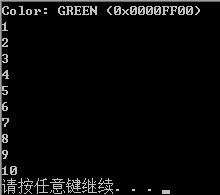1. enum enumeration type
1.1 Usage
- enum is a custom type in C
- enum values are integer values that can be customized as needed
- The first defined enum value defaults to 0
- By default, the enum value is added to the previous defined value by 1
- Variables of enum type can only take discrete values when they are defined
enum Color
{
GREEN, // GREEN==0;
RED= 2, // Custom RED==2;
BLUE // By default, 1 is added to the previous one, which is BLUE==3
};
enum Color c =GREEN;//Define c variable and initialize to GREEN
printf("%d\n",c);1.2 Special significance of enumeration types
- Values defined in enum are real constants in C
- enum is often used in engineering to define integer constants
1.3 Programming Experiments
- Use of enum
#include <stdio.h>
#include <stdlib.h>
enum // Anonymous enumeration, used to define constants
{
ARRAY_SIZE = 10 // Defines the size of the array, ARRAY_SIZE is a constant and cannot be changed at runtime
};
enum Color
{
RED = 0x00FF0000,
GREEN = 0x0000FF00,
BLUE = 0x000000FF //Notice that there is no semicolon behind
};
// Print, parameter is enumeration type
void PrintColor(enum Color c)
{
switch (c)
{
case RED:
printf("Color: RED (0x%08X)\n", c);
break;
case GREEN:
printf("Color: GREEN (0x%08X)\n", c);
break;
case BLUE:
printf("Color: BLUE(0x%08X)\n", c);
break;
}
}
// Initialize data
void InitArray(int array[])
{
int i = 0;
for (i = 0; i < ARRAY_SIZE; i++)
{
array[i] = i + 1;
}
}
void PrintArray(int array[])
{
int i = 0;
for (i = 0; i < ARRAY_SIZE; i++)
{
printf("%d\n", array[i]);
}
}
int main()
{
enum Color c = GREEN; // Define variable c and initialize to GREEN
int array[ARRAY_SIZE] = { 0 };
PrintColor(c);
InitArray(array);
PrintArray(array);
system("pause");
return 0;
}- Run result:

2. Use of the sizeof keyword
Introduction to 2.1 sizeof
- sizeof is a built-in indicator for the compiler
- sizeof is used to calculate the memory size of a type or variable
- The value of sizeof has been determined at compile time
- Sizeof is used for types: sizeof (type)
- Sizeof is used for variables: sizeof (var) or sizeof var
2.2 Correct the name of the sizeof Keyword - sizeof is a built-in keyword in C rather than a function
- All sizeof s will be replaced by specific values during compilation
- The execution of the program has nothing to do with sizeof
int var =0;
int size = sizeof(var++); // At compile time, the size of the line is calculated and
// Was replaced with a statement like int size=4; such a statement.Already existing
// The final code has no var++ statements.(Note,
// Var++ can be thought of as var = var+1; so sizeof(var++)
// Equivalent to calculating the size of the final variable var).
printf("var = %d, size = %d\n",var,size); //Output 0,4.Instead of 1,4;2.3 Programming Experiments
- The nature of sizeof
#include <stdio.h>
#include <stdlib.h>
int f()
{
printf("I like programming!\n");
return 0;
}
int main()
{
int var = 0;
int size = sizeof(var++); // The line was replaced at compile time with int size =4;
// So at runtime, no code like var++ exists
printf("var = %d, size = %d\n", var, size); // var = 0,size = 4;
size = sizeof(f()); // The line is replaced at compile time with size = sizeof (return value type of function) =4;
// That is, the final code will not output the printf inside f() without a call to the f() function
printf("size = %d\n", size); // size = 4;
system("pause");
return 0;
}3. Significance of typedef
Examiner: Can you tell us what typedef means?
Candidate: typedef is used to define a new type.(X)
- typedef is used to alias an existing data type
- typedef does not naturally produce new types
- Type renamed by typedef:
- You can define it after the typedef statement
- Cannot be modified by unsigned or signed (i.e. can no longer be defined as unsigned or signed)
- Usage: typedef type new_name;
3.1 Programming Experiments
- Example use of typedef
#include <stdio.h>
typedef int Int32;
// Define the type before renaming it
struct _tag_point
{
int x;
int y;
};
typedef struct _tag_point Point;
// Define an unnamed type and rename it with typedef
typedef struct
{
int length;
int array[];
} SoftArray;
// Rename first, then define the type - it seems illegal, awkward, but it's actually correct
// It can be understood that typedef does not check a type but simply gives an alias to a type.
// For example, in this example, struct _tag_list_node is renamed ListNode, which is encountered during later compilation
// ListNode is replaced with its actual type struct _tag_List_Node.
typedef struct _tag_list_node ListNode; // Rename first
struct _tag_list_node // Redefine type
{
ListNode *next;
};
int main()
{
Int32 i = -100; // int
unsigned Int32 ii = 0; //error, cannot specify signed or unsigned for renamed type
Point p; // struct _tag_point
SoftArray *sa = NULL;
ListNode *node = NULL; // struct _tag_list_node*
return 0;
}4. Summary
- enum is used to define discrete value types
- The value defined by enum is a real constant
- sizeof is a built-in indicator for the compiler
- sizeof does not participate in program execution
- Typedef is used to rename types: renamed types can be defined after a typedef statement